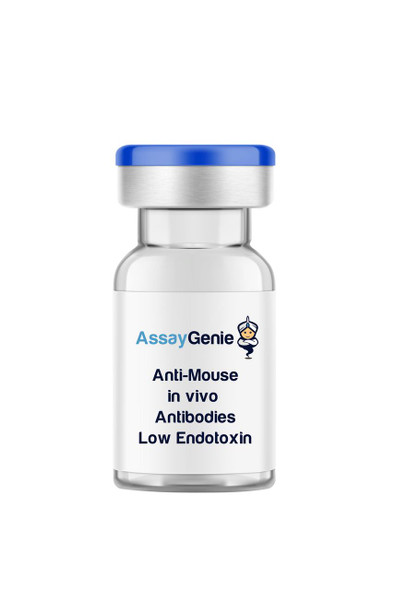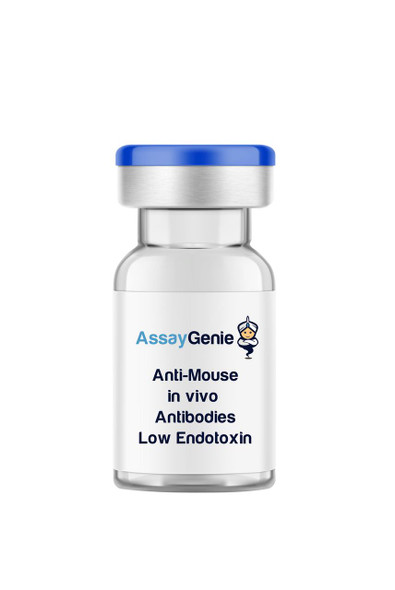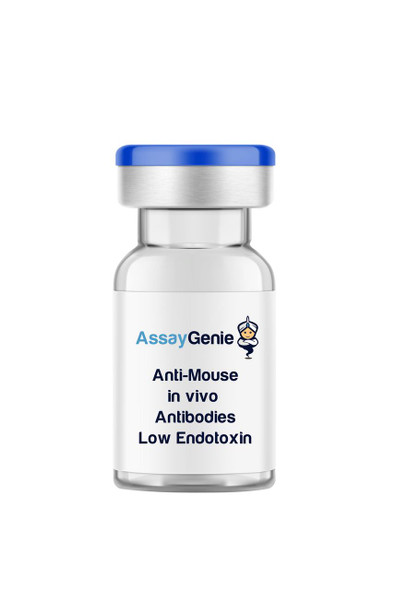Anti-Mouse CD8 In Vivo Antibody - Low Endotoxin
- SKU:
- IVMB0154
- Product Type:
- In Vivo Monoclonal Antibody
- Clone:
- YTS-169
- Protein:
- CD8
- Isotype:
- Rat IgG2b kappa
- Reactivity:
- Mouse
- Research Area:
- CD8+ T Cell Depletion
- Endotoxin Level:
- Low Endotoxin
- Host Species:
- Rat
- Applications:
- Depletion
- FC
- IHC FF
- WB
Description
| Product Name: | Anti-Mouse CD8 In Vivo Antibody - Low Endotoxin |
| Product Code: | IVMB0154 |
| Size: | 1mg, 5mg, 25mg, 50mg, 100mg |
| Clone: | YTS-169 |
| Protein: | CD8 |
| Product Type: | Monoclonal Antibody |
| Isotype: | Rat IgG2b κ |
| Reactivity: | Mouse |
| Immunogen: | CBA mouse thymocytes |
| Applications: | Depletion, FC, IHC FF, WB |
| Formulation: | This monoclonal antibody is aseptically packaged and formulated in 0.01 M phosphate buffered saline (150 mM NaCl) PBS pH 7.2 - 7.4 with no carrier protein, potassium, calcium or preservatives added. |
| Endotoxin Level: | < 1.0 EU/mg as determined by the LAL method |
| Purity: | ≥95% monomer by analytical SEC >95% by SDS Page |
| Preparation: | Functional grade preclinical antibodies are manufactured in an animal free facility using only In vitro protein free cell culture techniques and are purified by a multi-step process including the use of protein A or G to assure extremely low levels of endotoxins, leachable protein A or aggregates. |
| Storage and Handling: | Functional grade preclinical antibodies may be stored sterile as received at 2-8°C for up to one month. For longer term storage, aseptically aliquot in working volumes without diluting and store at -80°C. Avoid Repeated Freeze Thaw Cycles. |
| Applications: | Depletion, FC, IHC FF, WB |
| Recommended Usage: | FC The suggested concentration for this YTS-169 antibody for staining cells in flow cytometry is ≤ 0.2 µg per 106 in a volume of 100 µl. Titration of the reagent is recommended for optimal performance for each application. WB The suggested concentration for this YTS-169 antibody for use in western blotting is 1-10 µg/ml. |
| Reactivity: | Mouse |
| Host Species: | Rat |
| Specificity: | Clone YTS-169 recognizes human CD8. |
| Antigen Distribution: | CD8 is expressed on blood lymphocytes, a subset of NK cells, and thymocytes. Persons with HIV exhibit increased levels of CD8+ lymphocytes. |
| Immunogen: | CBA mouse thymocytes |
| Concentration: | ≥ 5.0 mg/ml |
| Endotoxin Level: | < 1.0 EU/mg as determined by the LAL method |
| Purity: | ≥95% monomer by analytical SEC >95% by SDS Page |
| Formulation: | This monoclonal antibody is aseptically packaged and formulated in 0.01 M phosphate buffered saline (150 mM NaCl) PBS pH 7.2 - 7.4 with no carrier protein, potassium, calcium or preservatives added. |
| Preparation: | Functional grade preclinical antibodies are manufactured in an animal free facility using only In vitro protein free cell culture techniques and are purified by a multi-step process including the use of protein A or G to assure extremely low levels of endotoxins, leachable protein A or aggregates. |
| Storage and Handling: | Functional grade preclinical antibodies may be stored sterile as received at 2-8°C for up to one month. For longer term storage, aseptically aliquot in working volumes without diluting and store at -80°C. Avoid Repeated Freeze Thaw Cycles. |
CD8 is made up of disulfide-linked α and β chains that form the α(CD8a)/β(CD8b) heterodimer and α/α homodimer. CD8 is part of the Ig superfamily that expresses primarily as CD8a homodimers. CD8a is a 32-34 kD type I glycoprotein that can also form heterodimers with CD8b. CD8 is an antigen co-receptor on T cells that mediates efficient cell to cell interactions within the immune system. CD8 coupled with the T cell receptor on the T lymphocyte recognizes an antigen displayed by an antigen presenting cell (APC) in the context of class I MHC molecules. The CD8 co-receptor also plays a role in T cell signaling by interacting with Lck (lymphocyte-specific protein tyrosine kinase) which leads to the activation of transcription factors that affect the expression of certain genes.
| Technical Datasheet: | View |
| Protein: | CD8 |
| Research Area: | Immunology |




![Anti-Mouse CD8 [YTS 169] In Vivo Antibody - Ultra Low Endotoxin Anti-Mouse CD8 [YTS 169] In Vivo Antibody - Ultra Low Endotoxin](https://cdn11.bigcommerce.com/s-39x6lpnvxv/images/stencil/590x590/products/119903/118086/anti-mouse-cd8-yts-169-in-vivo-antibody-ultra-low-endotoxin__27490__01155.1698937767.jpg?c=1)






